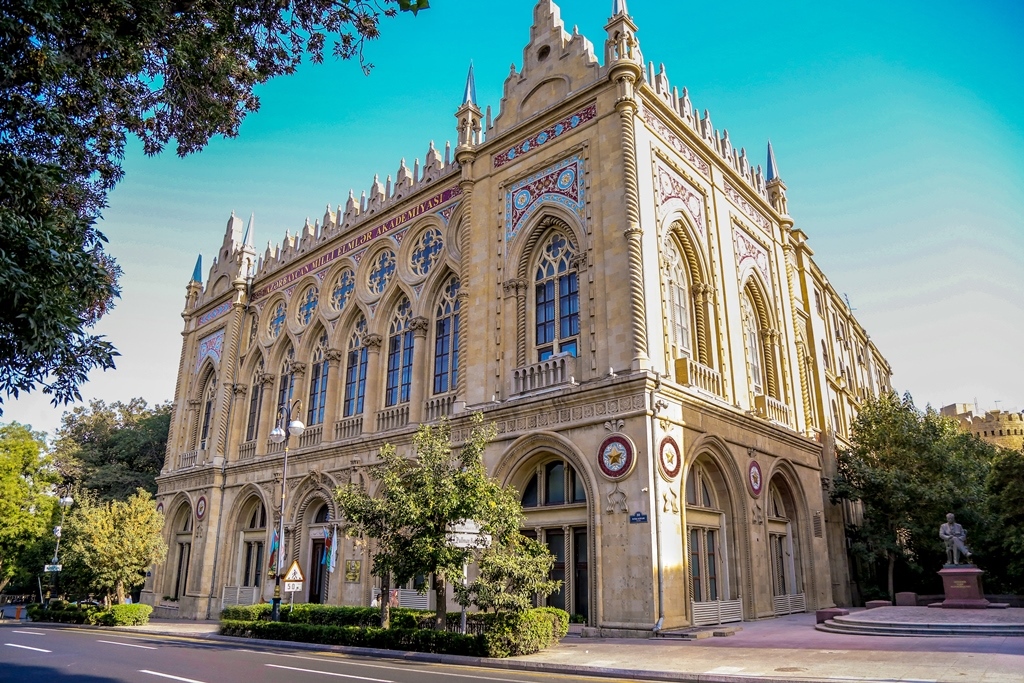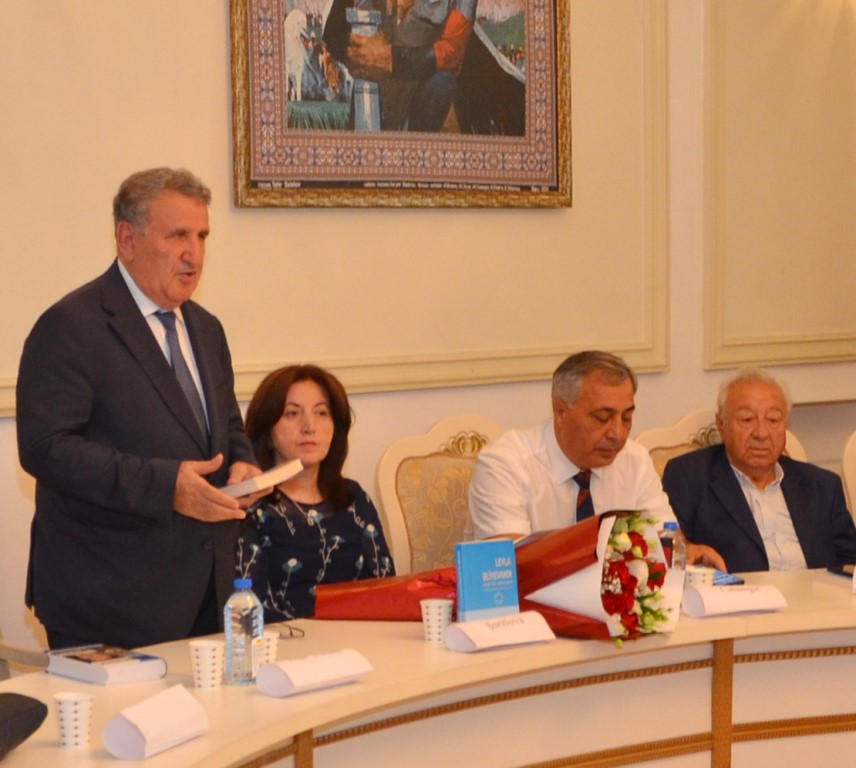- A-
- A
- A+
An international conference titled “Mahmud Kashgarı “Dîvânu Lugâti’t-Türk” - 950” was held at ANAS
An international scientific conference called “Mahmud Kashgarı “Dîvânu Lugâti’t-Türk”-950” was held at the main building of ANAS with the organization of the Institute of Linguistics named after Nasimi.
The conference assembled the president of ANAS, academician Isa Habibbeyli, head of Turkish Language Association, Professor Osman Mert, director of the Institute of Oriental Studies of the Academy of Sciences of Uzbekistan named after Abu Rayhan Beruni, Professor Bakhrom Abdukhalimov, president of the International Foundation named after Mahmud Kashgari, PhD in Philosophy Javanshir Feyziyev, employees of the Institute of Linguistics and mass media representatives.
The president of ANAS, academician Isa Habibbeyli delivered an opening speech at the conference saying that during his inauguration ceremony on February 14, the head of state highlighted the cooperation with the Turkic world as the key priority in the state policy and described the Organization of Turkic States as one family. The scientist noted that current historical stage enhances opportunities for further integration with the Turkic world, and added that significant progress has been made in this direction at ANAS.
The scientist assessed the publication of “Dîvânu Lugâti’t-Türk” by Mahmud Kashgarı, one of the most valuable books of the Turkic world, in Azerbaijan as an important event and emphasized that the international conference is another vivid example of the friendship and unity of the Turkic states. The head of ANAS pointed out that the source published in our native language would become an object of extensive research.
Academician Isa Habibbeyli highlighted the significance of the First Turkology Congress, held in Baku from February 26 to March 6, 1926 and emphasized that the congress addressed actual issues in Turkology within the scientific and cultural milieu of the early 20th century, including the decisions on transition to the Latin alphabet. He assessed the efforts to establish a common Turkic alphabet, the advancements in Turkology sciences, and the progress in international integration as significant contributions to the upcoming Second Turkology Congress in 2026.
Academician Isa Habibbeyli stated that the Holy Quran is the most fundamental book for the Muslim world, followed by numerous brilliant works that emerged, uniting the Turkic world through literature and social thought. He said that after the Quran, the most significant art work for the Turkic world is "Kitabi-Dede Gorgud," and the greatest scientific work is “Dîvânu Lugâti’t-Türk”.
The president of ANAS pointed out that the famous Azerbaijani scientist of Uzbek origin, Khalid Said Khojayev, was the first to translate “Dîvânu Lugâti’t-Türk” from Arabic into Azerbaijani. The academician further explained that Khalid Said Khojaev was denounced in 1937 as “a member of a counter-revolutionary pan-Turkist organization”, charged with carrying out intelligence tasks for Turkiye, and subsequently sentenced to death. His translation was deemed lost for decades until it was unearthed 86 years later, in 2023, from the archives of the Institute of Linguistics.
Academician Isa Habibbeyli emphasized that this work is an essential source for studying the historical development of Turkic languages and historical lexicology, as well as for compiling comparative grammar. He noted that the presentation of the book took place at ADA University in March of this year, involving the general public. Additionally, an international conference titled “Dîvânu Lugâti’t-Türk: Common Value of the Turkic World" was organized on June 24 in Bishkek, Kyrgyzstan, marking the 950th anniversary of its writing. The head of ANAS highlighted that the 950th anniversary of “Dîvânu Lugâti’t-Türk” will be celebrated in December of this year within UNESCO.
Later, the director of the Linguistics Institute of ANAS named after Nasimi, Professor Nadir Mammadli, referred to “Dîvânu Lugâti’t-Türk” as “Turkestan”, describing it as a comprehensive compilation of information about the Turkic world. He underlined that the work contains information about the lives of Turks in the 11th century and extensively reflects the history of today's Turkic peoples.
“Dîvânu Lugâti’t-Türk” serves as both a grammar of Turkic languages and an encyclopedia of its time”-said Professor Nadir Mammadli. He emphasized that the easiest language described in the book is that of the Oghuz people.
The professor also shared details on the historical process of how the book reached the Ottoman period, describing the translation of the “Dîvânu Lugâti’t-Türk” as the beginning of a new phase in the history of Azerbaijani Turkology.
It was noted that Mahmud Kashgari compiled linguistic and oral characteristics, dialects, and national cultural aspects of Turkic peoples in the encyclopedia “Dîvânu Lugâti’t-Türk”. He also established grammar and writing conventions of his time. This work is not merely a dictionary but also serves as a dialectological and ethnological resource, offering insights into language variations, geographical distribution, lifestyles, histories, mythologies, folklores, and cultures of Turkic tribes. It provides comprehensive information about Turkic tribal dialects from the early 11th century.
Speaking at the event, head of Turkish Language Association Professor Osman Mert, and director of the Institute of Oriental Studies of the Academy of Sciences of Uzbekistan named after Abu Rayhan Beruni, Professor Bakhrom Abdukhalimov praised “Dîvânu Lugâti’t-Türk” as a valuable work for understanding our past, language, identity, and history. They emphasized that this work laid the foundation for Turkic identity and Turkic grammar.
Further discussions at the conference included academician Nizami Jafarov's presentation “on Mahmud Kashgari's research method”, Professor Mahira Huseynova's “Mahmud Kashgari's "Divan" and the grammar of Turkic languages”, and Professor Ismayil Kazimov's “Mahmud Kashgari's "Divan" and modern Turkic languages”.
At the conference the member of the Milli Majlis and president of the Mahmud Kashgari International Foundation, PhD in Philosophy Javanshir Feyziyev, poet-translator Elkhan Zal Garakhanli, and critic Asad Jahangir also mentioned that “Dîvânu Lugâti’t-Türk” is the world's first Turkic dictionary in history. They underscored that this authoritative source defines the characteristics of the era in which it was written, bridging the thoughts and knowledge of a thousand years ago to the present day.
Translator: Reyhan Majidli, Public Relations, Press and Information Department of the Presidium Administration of ANAS
©All rights reserved. When using news www.science.gov.az a reference to the site is necessary.
Similar News
Links


 Elm TV
Elm TV
 Photo
Photo
 Video
Video
